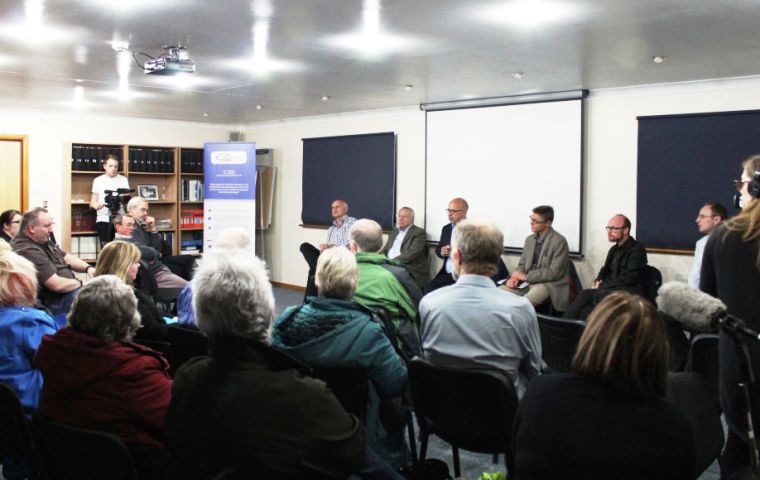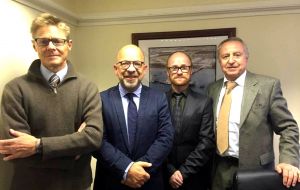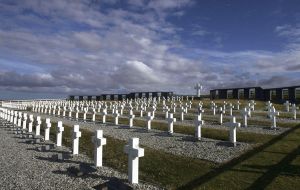MercoPress. South Atlantic News Agency
Falklands: Red Cross clear on Argentine families' wishes of identifying remains at Darwin cemetery
 The delegation were able to speak with Islanders: Stanley public meeting last night, (L to R) Mike Summers MLA and the ICRC delegations Edmond Corthesy, Laurent Corbaz, Morris Tidball-Binz and Oran
The delegation were able to speak with Islanders: Stanley public meeting last night, (L to R) Mike Summers MLA and the ICRC delegations Edmond Corthesy, Laurent Corbaz, Morris Tidball-Binz and Oran  The ICRC delegation which arrived to the Falklands on 27 June, Morris Tidball-Binz, Laurent Corbaz, Oran Finegan and Edmond Corthésy (Pic PN)
The ICRC delegation which arrived to the Falklands on 27 June, Morris Tidball-Binz, Laurent Corbaz, Oran Finegan and Edmond Corthésy (Pic PN)  The Argentine memorial cemetery in Darwin, where the feasibility of identifying 123 remains will be assessed
The Argentine memorial cemetery in Darwin, where the feasibility of identifying 123 remains will be assessed Members of the International Committee of the Red Cross (ICRC) currently visiting the Falkland Islands have stated they are quite clear on the wishes of the Argentine families, in relation to the potential future identification of remains of unknown Argentine soldiers in the Argentine memorial at Darwin.
The delegation revealed that ICRC took two long years to check the consent of the Argentine families with the initiative and ensure it was not political motivated.
The group of four, who are in the Falklands to look at practical steps involved in such a mission, and make recommendations to the UK, Argentine and Falklands governments told Penguin News on Tuesday that that was one of the points they had insisted on. Delegation head Laurent Corbaz said they had been involved in identifying, “all of the families concerned with Darwin,” and had been concerned with identifying all of those linked to the Islands, “and yes we have been cross checking this list with access to all individual cases.”
Edmond Corthésy (who was head of the ICRC's Buenos Aires delegation at the time of the South Atlantic conflict in 1982) said: “When we received this request from the Argentine government we didn’t rush to London to hand over the request. We took over two years in order to be sure of the wishes of the families; to check the consent of the families. We established forms and we established methodology in order to contact all of the families and to be sure that these were the wishes of the families, that it was not a political wish of the government.”
The group made it clear that apart from taking soil samples outside the cemetery in Darwin, there would be, “no other digging,” and the aim of the mission was as a study. Corbaz said they had an agreement with the three governments to: “assess the feasibility of identifying the people at Darwin: 123 of them.”
He added: “This week we have to examine the practical steps that we have to take so as to be in a position to do this. It will be complicated logistically. If we manage to do this it will mean that we will make some recommendations…” The report will be shared with the governments and discussed in September.
He emphasized:“From there onward frankly speaking I cannot tell you what will be the next step because I don’t know...”
When Penguin News suggested Islanders might wish that specialists undertaking future work should be from neutral countries Mr Corbaz said they had not discussed the number of people that would be needed to implement the operation. “But, he said, I can assure you that we are going to be extremely careful in the choice we are going to make in the people we are going to bring to the Islands.”
There would be a number of specialists required to dig: “That is certainly one of the conclusions of the report we are going to write at the end of this visit. This report will be discussed between Argentina and the UK under the auspices of the ICRC at one stage.
I don’t preclude that one or two of the specialists, but certainly not all, might be from Argentina. But that is purely hypothetical at this stage.”
The group is aware of the negative perception many Islanders have of the ICRC as a result of the 1982 War. Mr Corbaz said: “We acknowledge the fact that we came very late [to the War].”
Edmond Corthésy expanded: “We had been impeded in our effort to come to the Islands. At the end we could come on the 10th of June thanks to the British Army.”
He said he had sent two of his colleagues to Montevideo in Uruguay, “and they came here (Falklands) with a British hospital vessel and this vessel went to what we call the ‘Red Cross Box’. It was a neutral zone in the high seas where all the hospital vessels could meet and exchange wounded and so on.” Britain had four hospital ships and Argentina two.
“My colleagues were on the Uganda and had been transferred to the Bahía Paraíso. There were some visits from British officers to the Argentine vessels and the contrary too. My colleagues went to the Bahía Paraíso and came here to Stanley. They stayed two days, and had the opportunity to meet several hundred people and listened to them about their problems and discussed with them the best protection we could find because the war was at the door of Stanley. We decided, and the two parties accepted, to make a neutral zone in the church. It meant all civilians could be unified in the church in order to be protected. We put Red Cross flag and so on but it was the 14th of June and fortunately it was the last day of the conflict.”
Penguin News asked Mr. Cothesy about stories of Exocet missiles on a ‘Red Cross ship’. He said there were no Red Cross ships as such, but hospital ships.
“The Geneva Convention allows, as I explained before, an inspection of the hospital vessels, by the other party. This happened in the Red Cross Box. British officers went on the Bahía Paraíso and Argentine officers went to the Uganda, and the others, in order to check whether the disposition of the 2nd Geneva Convention were respected,” explained Mr. Cothesy.
He added: “I have heard allegations that our colleagues came from Argentina with an Argentine vessel. That is not right, they came from Montevideo on a British hospital ship Uganda.” Mr. Cothesy also revealed that the Red Cross visited one British prisoner of war, a Harrier pilot shot down and moved to Argentina, and also visited Argentine prisoners.
The delegation members were able to speak with Islanders at Goose Green on Wednesday, and on Thursday in Stanley. (Penguin News).




Top Comments
Disclaimer & comment rules-

-

-

Read all commentsArgentina wouldn't hide anything would they?
Jul 01st, 2016 - 09:20 am +1There is a very simple answer to all of this: repatriate the remains in a civilized manner to Argentina.
Jul 01st, 2016 - 05:39 pm +1TMBOA has gone now and the only political ructions will come from the so called 'veterans' and who GAF about that bunch of cowards?
Wouldn't it be better for the Falklanders to be rid of this damnable millstone?
5 Chris - it may well happen. The 2 forsenic experts in the team were clear that the only method - and even that they need to evaluate yet based on initial soil and ground works this week nearby - would be full exhumation to reveal sufficient for DNA matching - and even then they would still expect less than 100%matching so still would be some unknown - and even more trauma for the families concerned.
Jul 01st, 2016 - 09:21 pm +1I think if it does go ahead - then there will be a big push and demand from this side that all are exhumed and returned to Argentina.
No matter how independently done and out of sight of the press etc - once done and cemetery re-opened again there will be an avalanche of Argentines coming over(who are not family members) - paid for by their Govt - to hold “religious” services- wave flags in our faces - shout their insults at us etc etc. We have seen it all before- it will be manna from heaven for their Govt - current Govt no different so far in this regard to the last.
If its exhumation- remove and repatriate - and just leave behind a memorial
on the site - eg the existing roll of honour wall and cross - if they wish.
Commenting for this story is now closed.
If you have a Facebook account, become a fan and comment on our Facebook Page!